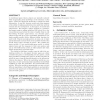62 search results - page 3 / 13 » Evolving explicit opponent models in game playing |
AAAI
2000
13 years 6 months ago
2000
A common challenge for agents in multiagent systems is trying to predict what other agents are going to do in the future. Such knowledge can help an agent determine which of its c...
ATAL
2010
Springer
13 years 6 months ago
2010
Springer
Planning how to interact against bounded memory and unbounded memory learning opponents needs different treatment. Thus far, however, work in this area has shown how to design pla...
ISIPTA
2003
IEEE
13 years 10 months ago
2003
IEEE
We discuss two approaches for choosing a strategy in a two-player game. We suppose that the game is played a large number of rounds, which allows the players to use observations o...
SIGECOM
2006
ACM
13 years 11 months ago
2006
ACM
In traditional game theory, players are typically endowed with exogenously given knowledge of the structure of the game—either full omniscient knowledge or partial but fixed in...
CIG
2006
IEEE
13 years 11 months ago
2006
IEEE
— This paper develops an approach to the capture and measurement of the information contained in opponents’ bet actions in seven card stud poker. We develop a causal model link...

